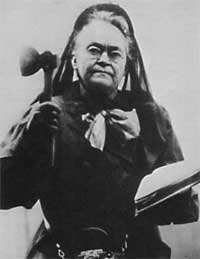Carrie Nation: She’s wielding a hatchet for a reason
Today is the birthday of intemperate temperance advocate Carrie Nation (1846-1911).
Here is Frye on what turned out to be the tail end of the temperance movement in an editorial, “So Many Lost Weekends,” published in the March 1947 issue of The Canadian Forum. (A twofer: Frye gets in a good dig at “monopoly capitalism” along the way.)
The latest gathering of the Ontario Temperance Federation, which coincided with the lifting of the liquor ration, included an abortive proposal to form a temperance party. It is with genuine concern that one sees the public utterances of Protestant churches increasingly identified with the impression that their churches regard the “liquor traffic” as of far greater importance than any theological doctrine, any other social question, or any other moral weakness. We say weakness, for the refusal to make any moral distinction between drinking and drunkenness constitutes a grave social problem; but unfortunately the effect of losing all sense of proportion about it is to make it seem almost trivial. And it can hardly be denied either that many clergymen have completely lost their sense of proportion about drinking, and have transformed a real issue into a superstitious taboo which is injurious to religion (it has, for example, alienated a large number from the churches whose support could have been had for the asking), which has no intelligible relationship to politics, and which is steadily losing all connection with doing good.
Many temperance advocates are only church politicians, but many are men with long and honourable careers in the support of liberal and socialist causes — a fact which is reflected in a certain realism with which they associate the drinking problem with profits and private enterprise. One is all the more surprised, therefore, to find them falling into the common reformers’ error of mistaking the effect for the cause. People take to drink because of psychological maladjustments or economic insecurity. The former any serious religion would regard as falling with the province of the “cure of souls”; the latter is an evil which nothing but an intelligently planned socialist movement can really cure. Socialists ask for the support of the Christian churches on the ground that the present system of monopoly capitalism is immoral as well as inefficient; and to divert all of one’s reforming energies from the central problem of insecurity to one of its by-products is, as drunkenness is, like pulling a leaf from a tree and expecting the tree to wither away. (CW 4, 246-7)

